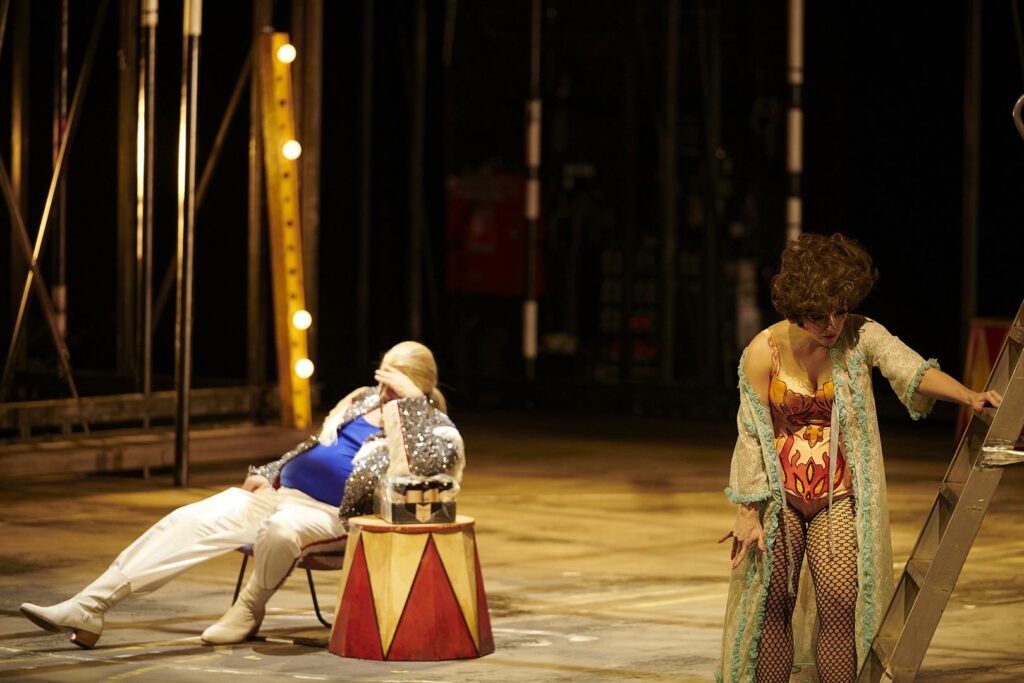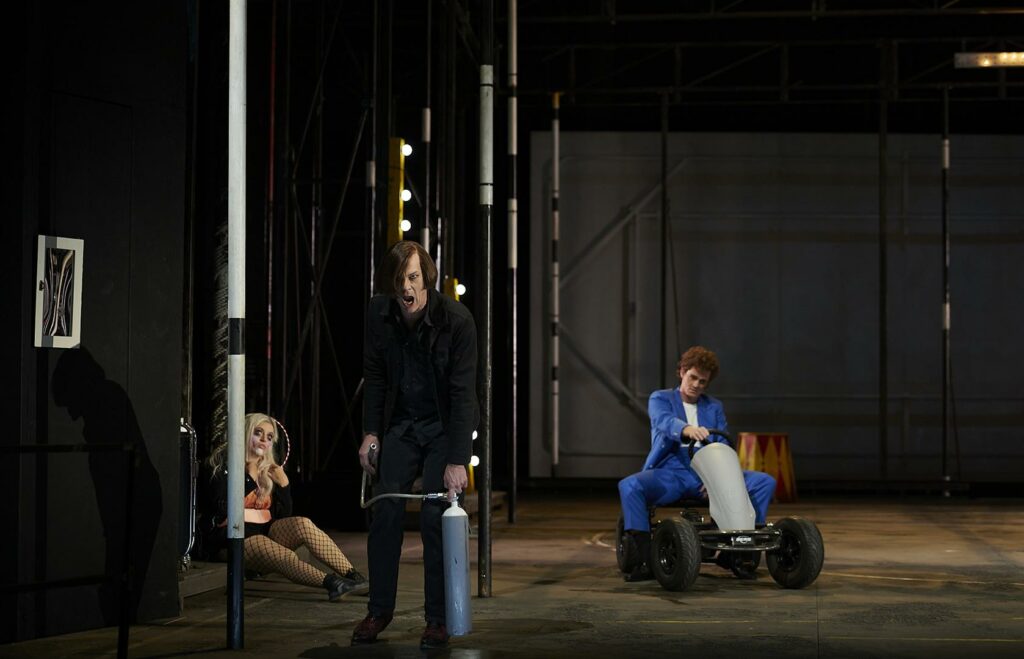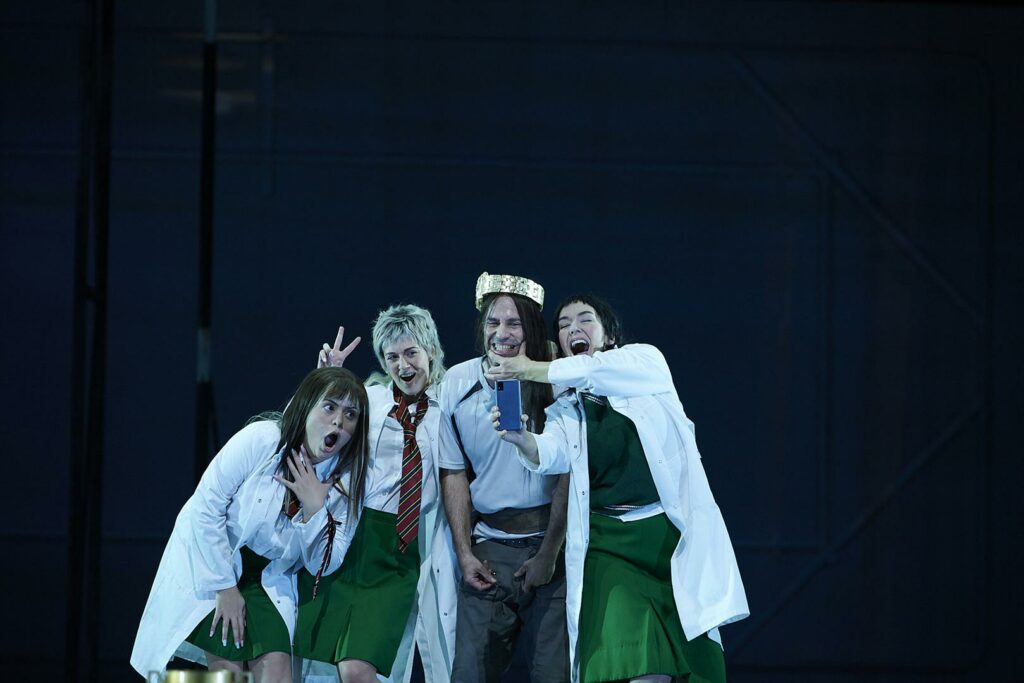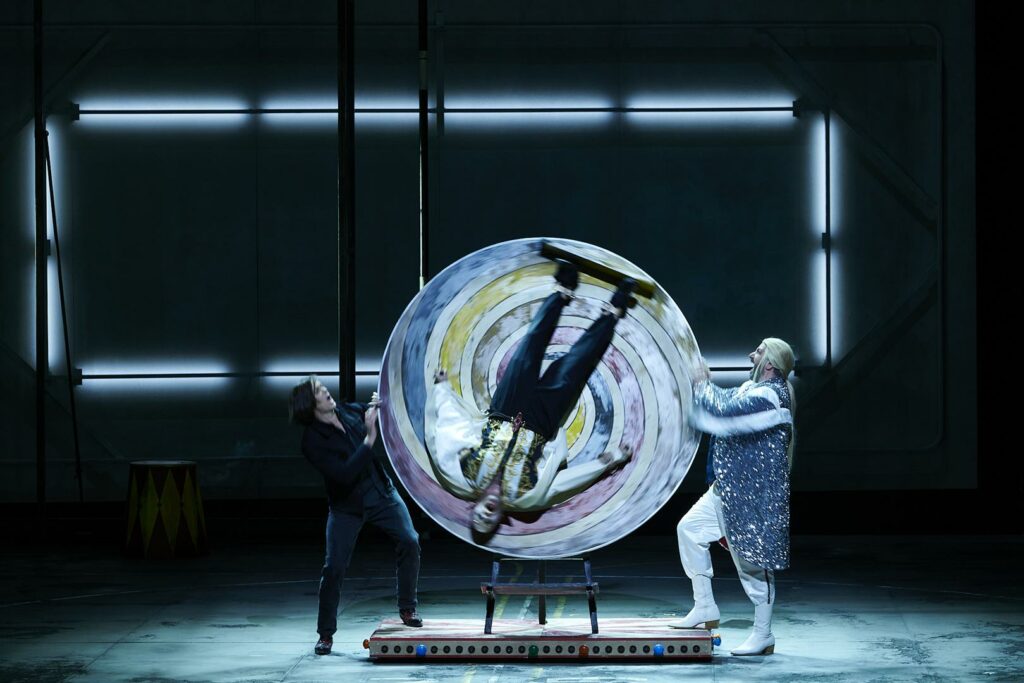You can have any review automatically translated. Just click on the Translate button,
which you can find in the Google bar above this article.
DAS RHEINGOLD IN CIRCUS FORMAT
Das Rheingold (The Rhinegold) by Richard Wagner. Vorabend (Prologue) to Der Ring des Nibelungen (The Ring of the Nibelung) in four scenes. 1854. Libretto by the composer. First performance at the Königliches Hof- und Nationaltheater, Munich, on 22nd September 1869.
Attended performance: 24 November 2021, Staatsoper Stuttgart.
Wotan: Goran Jurić; Donner: Paweł Konik; Froh: Moritz Kallenberg; Loge: Matthias Klink; Alberich: Leigh Melrose; Mime: Elmar Gilbertsson; Fasolt: David Steffens; Fafner: Rúni Brattaberg; Fricka: Rachael Wilson; Freia: Esther Dierkes; Erda: Stine Marie Fischer; Woglinde: Tamara Banješević; Wellgunde: Ida Ränzlöv; Floßhilde: Aytaj Shikhalizade; Staatsorchester Stuttgart; Dirigent: Cornelius Meister; Regie: Stephan Kimmig.
Music: 4,5*
Direction: 1,5*
Just as the baguette at your local bakery never reaches the level of “Les boulangers de Reuilly” in Paris (prize for best baguette 2021), nothing beats experiencing a Wagner opera in Germany. In Germany itself, we are tempted to write. It’s not up to us, and this is certainly not the place, to go into the background of this feeling. It would only lead to fruitless and hackneyed discussions.
We visited Das Rheingold. In Stuttgart. A city whose history dates back to Neolithic times, where Erwin Rommel was Commander of the 13th Infantry Regiment in 1920 and where the Allies dropped their bombs throughout the Second War. The opera house was built between 1909 and 1912 and consisted of two halls, the Großes Haus and the Kleines Haus. The Kleines Haus was destroyed during World War II. For some reason, the opera house in Stuttgart offers a more appropriate setting for a Wagner opera than the Teatro della Concordia in Monte Castello di Vibio, Italy, with their 99 seats.

The content of Das Rheingold – what’s there to say that Anna Russell hasn’t already said? (“The Ring is a magnificent work, supposing you can make any sense of it.”) See the video below.
Briefly:
At the bottom of the Rhine, the three Rhinemaidens guard the Rhine gold. The dwarf Alberich steals the gold, but only after first renouncing love. The supreme god Wotan has promised to give Freia, the goddess of youth, to the giants Fasolt and Fafner in exchange for the construction of a castle. When the giants demand their reward, Loge, the god of fire, proposes an alternative payment: the ring Alberich forged from Rhine gold. The giants agree, and Wotan and Loge set out to obtain the ring. They meet Alberich’s brother Mime, who tells Wotan and Loge how Alberich enslaved the Nibelungs. After some magical struggles, the dwarf is dragged to the surface, and Wotan tears the ring from his finger. Alberich curses the ring.
The giants claim their reward, and Wotan reluctantly grants them the ring. Then Alberich’s curse claims its first victim: Fafner kills his brother in a dispute over the treasure. As the voices of the Rhinemaidens lament the loss of their gold, the gods head for their new home, which Wotan calls “Valhalla.”


Wagner called Das Rheingold a prologue (“Vorabend”), preceding the rest of the Ring. It’s only thanks to the notion of a “prologue” that we get away with 2.5 hours and are spared the approximately 14 hours (Rossini: “Wagner has beautiful moments, but awful quarters of an hour.”) that Die Walküre, Siegfried and Götterdämmerung (all 4 together about 25 protagonists) have to cough up. The Rheingold‘s music, however, is alluring. The famous opening, describing the Rhine, lasts 163 bars, but we would gladly have it last the full 2.5 hours. The e-flat chord, followed by the broken chords and arpeggios, the harps – they are a fluid delight reminding us of the frame of mind that has gone rigid over the years: euphoria sweeps through the airy compartments of the skull, from which much knowing and enjoyment has flowed.

It’s actually a pity that those Rhinemaidens have to burst into song: “Weia! Waga! Woge, du Welle, walle zur Wiege! wagala weia! wallala, weiala weia!” They could teach Snoop Dogg a lesson or two. Not that there isn’t much to enjoy after the weias: the massive chords for the giants, the serene and reverent music for Erda and the disquieting notes for Loge are delights that give a fragile constitution the esthetic armor to fend off the vulgar sleaze of everyday life (Pepsi ads, Hardcore Pawn, woke hooligans etc.) with pride.
In Stuttgart, most of the roles were performed well to very well by the Staatsoper ensemble. Goran Jurić was a somewhat timid Wotan, bereft of eyepatch and spear, Kammersänger Matthias Klink in a starring role as a slippery, sneaky Loge, Rachael Wilson as Fricka, Stine Marie Fischer as climate activist Erda, and David Steffens and Rúni Brattaberg as Fasolt and Fafner. English baritone Leigh Melrose, who was recently seen and heard in Amsterdam as Kajin in Die ersten Menschen took on the role of Alberich with verve. Creepy gnome, scary creepy.

Director Stephan Kimmig adheres strictly to contemporary conventions: the spotlight doesn’t shine on Wagner but on the climate, capitalism, etc. etc. It all seems to be very unmythical and surrealistic, but Kimmig obediently does what is expected of him: no connection to Wagner, no connection to Rheingold. Thus: a decaying fairground, evil clowns, bright yellow forklifts and seamy neon signs. And a beautifully polished bicycle; for that polish, the director gets an extra half star. You won’t be surprised to hear that there was no trace of any rainbow, of any divine Valhalla castle, of any Rhine or of any Nibelheim. Rachael Wilson (Fricka) proved to be the best student in the class. She stated in an interview that Das Rheingold must be conveyed comically, “because the story is absurd.” If that’s a reason, then in our opinion almost all operas should be conveyed comically. Exasperating nonsense, in other words.
Cornelius Meister, the conductor of the beautifully balanced State Orchestra, likes – without disregarding grandeur – to hurry things along; which is not unwelcome during 2 to 3 hours of Wagner without an interval. And with an obligatory face mask on to boot.
Whatever the case may be: the music is superb.
